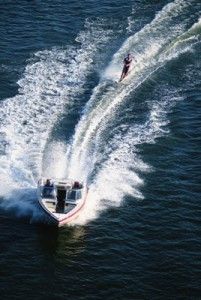North Carolina has more than 37,000 miles of waterways, 30,000 registered water vessels, and 80 different bodies of water with over 200 free access areas. It is only natural that a favorite recreational activity in North Carolina is spending time enjoying the beautiful rivers, lakes, and beaches that are in our state. Summer means an increase in people enjoying water sports and boating throughout the state. Unfortunately, some people will enjoy a little too much alcohol or other impairing substance as they are enjoying their water recreational activities.
North Carolina Boating While Impaired (BWI) Laws
North Carolina takes a strong stance against boating while impaired just as it does against driving while impaired. While the penalties for a boating while impaired conviction are not as severe, it is still a Class 2 misdemeanor that can result in fines, community service, and jail time. A BWI charge should not be ignored. You need an attorney who is familiar with the boating while impaired laws for North Carolina to represent you in court.
While it is not illegal for you or your passengers to consume alcohol on your boat, even when the boat is in operation, it is illegal for you to operate the boat while impaired by alcohol. NC G.S. 75A-10(b1) specifically states, “No person shall operate any vessel while underway on the waters of this State while under the influence of an impairing substance or after having consumed sufficient alcohol that the person has, at any relevant time after the boating, an alcohol concentration of 0.08 or more.”
The U.S. Coast Guard, North Carolina Wildlife Resource officers, Marine Fisheries officers, game wardens, and local and state police officers are authorized to stop and board vessels on the water, at boat ramps, and in parking lots. In the case of a DWI, the officer must have a reasonable suspicion of impairment before making a DWI stop. This does not apply in BWI stops because an officer can stop a boat at any time to check for safety equipment.
Officers use Portable Breath Tests and field sobriety tests to determine if you are boating while impaired. Just like in a DWI stop, you can refuse to take these tests. If you are arrested for boating while impaired, you will be expected to take a breathalyzer test at the station. If you refuse to take a breath test at the station, your refusal will not affect your driver’s license as it does in a DWI arrest. Be aware that the officer can obtain a warrant forcing you to submit to a blood test.
Because boating while impaired laws differ from DWI laws, it is very important for you to retain an attorney with experience handling BWI cases. There are numerous defense strategies for boating while impaired; however, you need an experienced BWI attorney who understands the law in order to develop a strong defense strategy.
Contact an Experienced Jacksonville Boating DWI Attorney
“Attorneys Who Aggressively Protect Your Rights”
Welch and Harris, LLP is a full-service Jacksonville Criminal and Civil law firm that is committed to providing results-driven legal representation to businesses and individuals seeking an alternative to large-firm representation. We focus on getting you the results you want while offering you a cost-effective solution to your legal needs. We understand that we work for our clients; therefore; our attorneys communicate regularly with each client to ensure that the client knows what is going on with the case.
When you have legal problems, you need an experienced legal professional in your corner. No matter the case, you should have an attorney working for you who knows the law and who has the experience to get results. We represent clients throughout Duplin County, Onslow County and the surrounding communities. Call our office at (910) 405-8459 or contact us online today for a free case evaluation.

